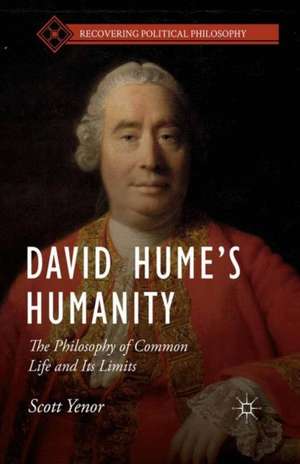David Hume’s Humanity: The Philosophy of Common Life and Its Limits: Recovering Political Philosophy
Autor S. Yenoren Limba Engleză Paperback – 25 feb 2017
Din seria Recovering Political Philosophy
-
 Preț: 382.95 lei
Preț: 382.95 lei -
 Preț: 382.75 lei
Preț: 382.75 lei -
 Preț: 386.61 lei
Preț: 386.61 lei -
 Preț: 384.86 lei
Preț: 384.86 lei -
 Preț: 357.43 lei
Preț: 357.43 lei - 15%
 Preț: 702.24 lei
Preț: 702.24 lei - 18%
 Preț: 726.06 lei
Preț: 726.06 lei -
 Preț: 382.75 lei
Preț: 382.75 lei -
 Preț: 386.81 lei
Preț: 386.81 lei -
 Preț: 211.29 lei
Preț: 211.29 lei - 15%
 Preț: 646.75 lei
Preț: 646.75 lei - 18%
 Preț: 728.28 lei
Preț: 728.28 lei - 8%
 Preț: 487.95 lei
Preț: 487.95 lei - 15%
 Preț: 641.71 lei
Preț: 641.71 lei - 18%
 Preț: 786.98 lei
Preț: 786.98 lei -
 Preț: 201.06 lei
Preț: 201.06 lei -
 Preț: 214.57 lei
Preț: 214.57 lei - 15%
 Preț: 579.20 lei
Preț: 579.20 lei -
 Preț: 176.74 lei
Preț: 176.74 lei - 15%
 Preț: 577.07 lei
Preț: 577.07 lei - 15%
 Preț: 583.61 lei
Preț: 583.61 lei - 18%
 Preț: 777.20 lei
Preț: 777.20 lei - 15%
 Preț: 693.57 lei
Preț: 693.57 lei - 15%
 Preț: 698.30 lei
Preț: 698.30 lei - 18%
 Preț: 727.97 lei
Preț: 727.97 lei - 18%
 Preț: 786.18 lei
Preț: 786.18 lei -

Preț: 265.36 lei
Nou
Puncte Express: 398
Preț estimativ în valută:
50.78€ • 55.14$ • 42.66£
50.78€ • 55.14$ • 42.66£
Carte tipărită la comandă
Livrare economică 23 aprilie-07 mai
Preluare comenzi: 021 569.72.76
Specificații
ISBN-13: 9781349711932
ISBN-10: 1349711934
Pagini: 246
Ilustrații: XV, 246 p.
Dimensiuni: 140 x 216 x 14 mm
Greutate: 0.31 kg
Ediția:1st ed. 2016
Editura: Palgrave Macmillan US
Colecția Palgrave Macmillan
Seria Recovering Political Philosophy
Locul publicării:New York, United States
ISBN-10: 1349711934
Pagini: 246
Ilustrații: XV, 246 p.
Dimensiuni: 140 x 216 x 14 mm
Greutate: 0.31 kg
Ediția:1st ed. 2016
Editura: Palgrave Macmillan US
Colecția Palgrave Macmillan
Seria Recovering Political Philosophy
Locul publicării:New York, United States
Cuprins
1. The Promise of Hume's Philosophy of Common Life
2. 'Nothing but Sophistry and Illusion': Metaphysical Speculation Before Hume
3. Active Sovereignty in Natural and Moral Philosophy
4. 'Mitigated Scepticism' and Our 'Mixed Kind of Life': The Philosophic Modesty of Hume's Science of Common Life
5. The Liberal Imagination and the Problem of Abstract Speculative Principles in Politics
6. Humanity and Commerce
7. Religious Revolution and England's Humane Political Constitution
8. Religious Belief and Hume's Philosophy of Common Life
9. Humanity and Theology in Hume's Religious Dialogues
10. Toward a More Philosophical Philosophy of Common Life
2. 'Nothing but Sophistry and Illusion': Metaphysical Speculation Before Hume
3. Active Sovereignty in Natural and Moral Philosophy
4. 'Mitigated Scepticism' and Our 'Mixed Kind of Life': The Philosophic Modesty of Hume's Science of Common Life
5. The Liberal Imagination and the Problem of Abstract Speculative Principles in Politics
6. Humanity and Commerce
7. Religious Revolution and England's Humane Political Constitution
8. Religious Belief and Hume's Philosophy of Common Life
9. Humanity and Theology in Hume's Religious Dialogues
10. Toward a More Philosophical Philosophy of Common Life
Recenzii
“David Hume’s Humanity: The Philosophy of Common Life and Its Limits … not only presents a synoptic vision of Hume’s thought, but also argues that an amended version of it remains vital and relevant today – especially to political philosophy.” (Nathan Sasser,Journal of Scottish Philosophy, Vol. 17 (1), 2019)
Notă biografică
Scott Yenor is a Professor of Political Science at Boise State University, USA, where he teaches political philosophy. He is the author of Family Politics: The Idea of Marriage in Modern Political Thought (2011). He earned his PhD in Political Science from Loyola University Chicago.
Textul de pe ultima copertă
Scott Yenor argues that David Hume's reputation as a skeptic is greatly exaggerated. In David Hume's Humanity, Yenor shows how Hume's skepticism is a moment leading Hume to defend a philosophy that is grounded in the inescapable assumptions of common life. Humane virtues reflect the proper reaction to the complex mixture of human faculties that define the human condition. These gentle virtues best find their home in the modern commercial republic, of which England is the leading example. Hume's defense of both common life philosophy and humanity are, however, flawed by his secretly dogmatic assumptions about the nature of history and his Enlightened approach to religious teachings and psychology. This study makes the case for Hume's manner of grounding philosophy in common life is essential to any reinvigoration of the humanities. It ultimately holds that Hume's practice of that philosophy is seriously flawed, but that a more philosophic philosophy of common life is available.
